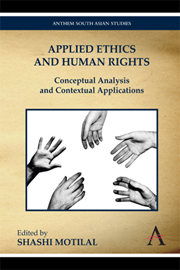Book contents
- Frontmatter
- Contents
- Preface
- Introduction
- Part One Rights, Obligations and Responsibilities
- Part Two Human Rights Issues
- 10 Fragile Identities and Constructed Rights
- 11 Affirmative Action: Compensation or Discrimination?
- 12 Ethics, Human Rights and the LGBT Discourse in India
- 13 Distributive Justice: Locating in Context
- 14 Punishment and Human Rights
- 15 Rights of the ‘Mad’ in Mental Health Sciences
- 16 Choice, Life and the (m)Other: Towards Ethics in/of Abortion
- 17 The Nationalist Project and the Women's Question: A Reading of The Home and the World and Nationalism
- 18 On the Idea of Obligation to Future Generations
- 19 Morality in Cyberspace: Intellectual Property and the Right to Information
- 20 Violence – A Right to the Survival of the Self?
- 21 ‘Moral Obligation’ to Fight for the Prevention of Greater Calamity: A Debate between Sādharana Dharma and Sva Dharma
- 22 Globalisation and Human Rights
- Notes on Contributors
14 - Punishment and Human Rights
from Part Two - Human Rights Issues
Published online by Cambridge University Press: 05 March 2012
- Frontmatter
- Contents
- Preface
- Introduction
- Part One Rights, Obligations and Responsibilities
- Part Two Human Rights Issues
- 10 Fragile Identities and Constructed Rights
- 11 Affirmative Action: Compensation or Discrimination?
- 12 Ethics, Human Rights and the LGBT Discourse in India
- 13 Distributive Justice: Locating in Context
- 14 Punishment and Human Rights
- 15 Rights of the ‘Mad’ in Mental Health Sciences
- 16 Choice, Life and the (m)Other: Towards Ethics in/of Abortion
- 17 The Nationalist Project and the Women's Question: A Reading of The Home and the World and Nationalism
- 18 On the Idea of Obligation to Future Generations
- 19 Morality in Cyberspace: Intellectual Property and the Right to Information
- 20 Violence – A Right to the Survival of the Self?
- 21 ‘Moral Obligation’ to Fight for the Prevention of Greater Calamity: A Debate between Sādharana Dharma and Sva Dharma
- 22 Globalisation and Human Rights
- Notes on Contributors
Summary
The application of the philosophical theories of right and wrong in the moral rhetoric that surrounds many a burning issue today has become a raging fashion, at least in the West. Unfortunately this fact clouds the very real and significant contribution that a rigorous and systematic training in philosophical analysis can make towards a balanced and even-handed approach to questions such as abortion, euthanasia, cloning, animal rights, suicide and human rights. Philosophy needs not only to lend techniques of reasoning to a moral debate. It actually helps us to take sides while appreciating the strengths of opposing arguments.
There is much moral rhetoric that one finds in magazine articles and lobbyist pamphlets on the issue of human rights. But strangely not much public debate goes into the question of punishment and what is befitting treatment for a transgressor who has sinned against society. What, if any, consideration is given to the protection of human rights of the sinner, the criminal. One aspect of the whole subject of punishment, however, has received a sizeable amount of attention and that is the question of capital punishment. Anyone and everyone has something to say about it but the interesting questions are raised by the philosophers. There is the question of whether the capital punishment is another form of killing that lobbyists or philosophers have to justify. There are utilitarian arguments for and against it.
- Type
- Chapter
- Information
- Applied Ethics and Human RightsConceptual Analysis and Contextual Applications, pp. 183 - 192Publisher: Anthem PressPrint publication year: 2010
- 1
- Cited by



